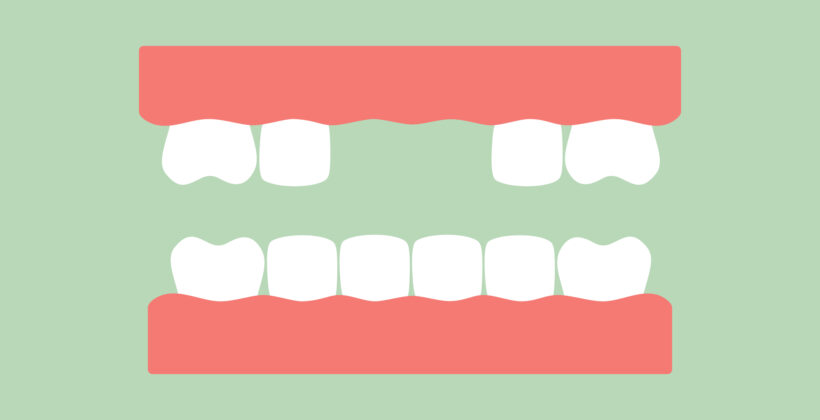Did you know that 120 million people in the U.S. have at least one missing tooth? Thirty-six million don’t have any teeth at all. Preventing tooth loss includes practicing good oral hygiene, eating properly, wearing a mouthguard when playing sports, and visiting the dentist every six months. For older adults, having missing teeth may seem inevitable, but it isn’t. it is possible to live your entire life with the same set of teeth. We want to help you achieve that goal!
The best way to prevent missing teeth is to understand what causes it. Then, our dentist will explain treatments for those who do experience tooth loss.
Causes of Missing Teeth
There’s always a reason behind a person’s tooth loss. However, missing teeth can be a genetic disorder that prevents permanent teeth from developing. This condition is called hypodontia when six or fewer teeth fail to develop and oligodontia when more than six teeth fail to develop.
Other causes of missing teeth include:
- Untreated cavities
- Untreated gum disease
- Sports injuries
- Car accidents
- Other types of trauma
Most of these causes can be prevented. However, we understand that accidents happen. No matter the cause of a person’s missing teeth, treatment is available.
Consequences of Missing Teeth
Having one or more missing teeth comes with serious oral, overall, and mental health consequences.
As for oral health, patients who have suffered from tooth loss are more likely to experience more of it. Missing teeth make a person more susceptible to cavities and gum disease as well as jawbone deterioration.
The link between oral and overall health cannot be denied. One of the biggest ways missing teeth affects the rest of the body is by limiting the number of nutrients consumed while eating. Missing teeth make it difficult to properly chew food which can also lead to digestive issues.
Having an imperfect and incomplete smile can also cause low self-esteem which opens up the door to mental health problems as well as poor performance at work, a lack of a social life, and unhealthy relationship habits.
Treatments for Tooth Loss
Restorative dentistry procedures aim to restore the strength and beauty of a person’s smile. For patients with missing teeth, a dentist may recommend one of the following treatments:
Dental Bridge
Dental bridges work best for replacing one, two, or three missing teeth in a row. The bridge consists of two dental crowns on both sides of the prosthetic teeth.
To place the bridge, a small amount of enamel must be removed from the patient’s natural teeth. Dental bridges look, feel, and function just like natural teeth.
Dentures
Dentures are a popular choice for patients who are missing an entire arch of missing teeth. Though not a permanent option, they do a great job of restoring beauty and most function. When dentures are made properly, they are comfortable and easy to use.
Patients who choose dentures may need to have them refitted or reformed every year or so.
Dental Implants
Dental implants are the most beneficial tooth-replacement option for patients with missing teeth. The entire procedure takes between six and eighteen months, but the results are worth it!
Dental implants are the only restorative option that replaces a missing tooth from the root to the crown. The implant is actually a small, screw-like rod that inserts into the jawbone. This creates stability and provides optimal function. It also encourages jawbone regeneration which means that the patient will not suffer from jawbone deterioration and facial atrophy. This is the only restorative procedure that provides that benefit!
Once healed, the dentist places an abutment and crown on top of the implant to complete the procedure.
Dental bridges and dentures can also be attached to implants.
Missing Teeth Treatment in Lombard, IL
Ready to restore the beauty and function of your smile? Contact Dr. Julie Glud’s office today at 630-629-5700 to schedule an initial consultation.

